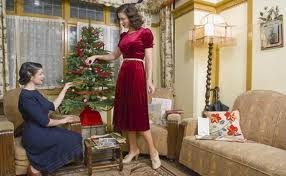 Christmas during the Second World War in Great Britain was celebrated with gusto in 1939. The government suggested that the population should carry on as if nothing had happened – this might be the last time they could have a traditional British Christmas.
Christmas during the Second World War in Great Britain was celebrated with gusto in 1939. The government suggested that the population should carry on as if nothing had happened – this might be the last time they could have a traditional British Christmas.The Minister of Transport sent this Christmas message to the British public. 'I wish I could be a Santa Claus this Christmas and produce out of the bag hundreds of extra trains, miles of additional tracks and thousands of extra railway workers, so that you could travel where and as you wish – and in comfort.
Indeed, I have to curtail Christmas passenger trains and try to persuade you not to travel at all. You know this must be a stern Christmas-tide – one during which we must work for victory. The enemy won't wait while we take a Christmas holiday, and therefore railways must continue to devote all their energies to vital war transport.
There are no extra holidays for railway workers – for you no extra travelling facilities. Forgive no presents this year, but best wishes for Christmas and the New Year.'
The Post Office also made an appeal to the public, this time to post early. (No change there then.)
Posting should be completed by December 18, and the earlier the better. In normal times the Post Office has a difficult task of disposing of the heavy Christmas traffic, and the task can only be accomplished by engaging some 80,000 temporary workers throughout the country. This year the difficulties have been increased because of the release of 40,000 trained men for the Forces, the slowing up of road and rail transport because of the blackout, and the need for confining deliveries, and collections, as far as possible, to the short hours of daylight.
Home decorations became a do-it-yourself affair.
Woman & Home had a Christmas special in which they suggested the Christmas table could be made special by decorating the drinking glasses with coloured stars cut from sticky paper and stuck on the outside of the glass. It also suggested that pine-cone clusters should be hung about the house. These to be made of strands of plaited, coloured raffia which were attached to the cones. Said cones could be painted gold or silver or other "gay colours".
No doubt paper chains were made and hung about the place.
Those that live in rural areas obviously fared better than city dwellers but they were less likely to be bombed and had access to 'wild' food such as berries, mushrooms and rabbit. There was also more likelihood of them getting eggs and dairy products from local farms. If there was alcohol it would perhaps be home-made wine in the country, and beer at the pub for everyone else.
Everyone knows about famous truce in the trenches the first Christmas of World War I but did you know that Christmas of 1940 the German Embassy in Washington sent word to the British Government that Germany was prepared to suspend bombing missions against Britain over the Christmas period if the RAF did the same. No formal arrangement was made, but neither side launched any attacks between Christmas Eve and Boxing Day. As the weather was overcast the lack of attacks was attributed to this.
I hope you all have happy Christmas and a peaceful and healthy New Year.
http://amzn.to/1jFvjie (US)
http://amzn.to/1Xod5Qw (UK)
Christmas at Highfield Court was previously published as Lord Atherton's Ward.
Extra scenes have been added to this book.
When their father, Sir John, dies leaving Sarah Ellison and her younger sister Jane orphaned, his choice of guardian is entirely disagreeable to Sarah – particularly with Lord Atherton's insistence that they leave their family home and move to Highfield Court to remain under the care of his mother. Will the spirit of Christmas work it's magic or will Sarah continue to alienate Lord Atherton with her headstrong behaviour or prove that she is a girl he can respect?
Extra scenes have been added to this book.
When their father, Sir John, dies leaving Sarah Ellison and her younger sister Jane orphaned, his choice of guardian is entirely disagreeable to Sarah – particularly with Lord Atherton's insistence that they leave their family home and move to Highfield Court to remain under the care of his mother. Will the spirit of Christmas work it's magic or will Sarah continue to alienate Lord Atherton with her headstrong behaviour or prove that she is a girl he can respect?
Fenella J Miller




1 comment:
I was interested to see in your picture of the two women decorating the Christmas tree, that neither of them was dressed for cold weather. I imagine that most houses lacked central heating in the 1940s - so the depiction was obviously wishful thinking!
Post a Comment